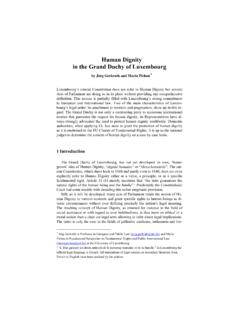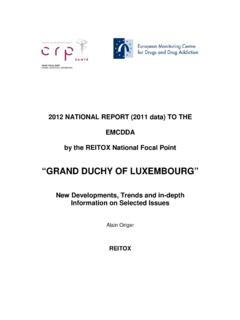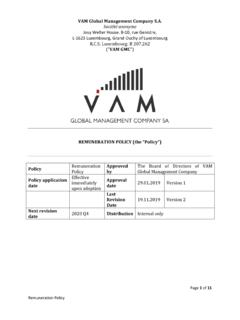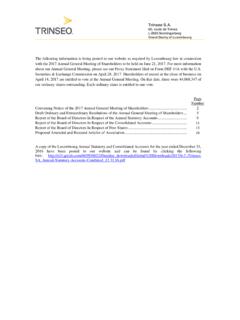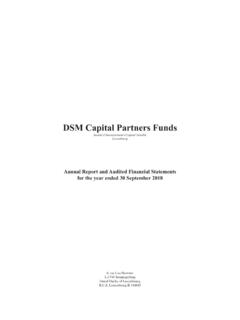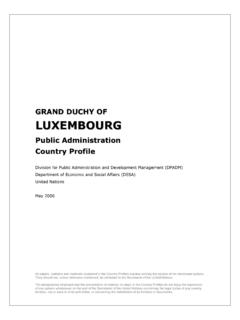Transcription of 1999 Income and Capital Tax Convention and Final Protocol ...
1 1999 Income and Capital Tax Convention and Final Protocol , as Amended (English Translation) Signed date: May 25, 1999 In force date: December 30, 2000 Effective date: January 1, 2001. See Article 30. Status: In Force This Convention , signed May 25, 1999, has been amended by a Protocol signed September 7, 2010. Convention BETWEEN THE PORTUGUESE REPUBLIC AND THE grand - duchy OF luxembourg FOR THE AVOIDANCE OF DOUBLE TAXATION AND THE PREVENTION OF FISCAL EVASION WITH RESEPECT TO TAXES ON Income AND ON Capital [TRANSLATION] The Government of the Portuguese Republic and the Government of the grand - duchy of luxembourg , desiring to conclude a Convention for the avoidance of double taxation and the prevention of fiscal evasion with resepct to taxes on Income and on Capital , have agreed as follows: Article 1 Personal Scope This Convention shall apply to persons who are residents of one or both of the Contracting States. Article 2 Taxes Covered 1) The existing taxes to which the Convention shall apply are in particular: a) insofar as luxembourg is concerned: i) Income tax (l'imp t des personnes physiques); ii) corporate Income tax (l'imp t sur le revenu des collectivit s); iii) special tax on royalties (l'imp t sp cial sur les tanti mes); iv) profit tax (l'imp t sur la fortune); v) commercial community tax (l'imp t commercial communal), and vi) property tax (l'imp t foncier); (which shall hereinafter be referred to as luxembourg Tax ).
2 B) insofar as Portugal is concerned: i) Income tax (imposto sobre o rendimento das pessoas singulares - IRS); ii) corporate Income tax (imposto sobre o rendimento das pessoas colectivas - IRC); iii) additional local tax on corporate Income (derrama); iv) property tax for municipalities (contribui o aut rquica); (which shall hereinafter be referred to as Portuguese Tax ). 2) The Convention shall apply also to any identical or substantially similar taxes which are imposed after the date of signature of the Convention in addition to, or in place of, the existing taxes. The competent authorities of the Contracting States shall notify each other at the beginning of each year of significant changes which have been made in their respective taxation laws during the preceding year. Article 3 General Definitions 1) For the purposes of this present Convention , unless the context requires a different interpretation: a) the terms Contracting State or the other Contracting State refer to luxembourg or Portugal, according to the context herewith.
3 B) in its geographic sense, the term luxembourg refers to the territory of the grand - duchy of luxembourg . c) in its geographic sense, the term Portugal refers to the territory of the Portuguese Republic situated on the European continent and the archipelagos of the Azores and Madeira, the territorial waters and in addition thereto the areas over which, in conformity with Portuguese and international law, the Portuguese Republic has jurisdiction and with respect to which it has sovereign rights for the purpose of exploration and exploitation of the natural resources of the sea bottom, the subsoil and water columns. d) the term Person refers to any individual or company or group of people. e) the term Company refers to any body corporate or any entity which is treated as a body corporate for tax purposes; f) the terms Enterprise of a Contracting State and Enterprise of the other Contracting State refer respectively to an enterprise carried on by a resident of a Contracting State and an enterprise carried on by a resident of the other Contracting State; g) the term International Traffic means any transport by a ship or aircraft operated by an enterprise whose place of effective management is situated in a Contracting State, except when the ship or aircraft is operated solely between places in the other Contracting State; h) the term Competent Authority refers to the following: i) insofar as luxembourg is concerned, the Minister of Finance or his/her authorized representative; ii) insofar as Portugal is concerned, the Minister of Finance, the Director-General of Taxes, or their authorized representatives.
4 2) As regards the application of the Convention by a Contracting State any term not defined therein shall, unless the context otherwise requires, have the meaning which it has under the law of that State concerning the taxes to which the Convention applies. Article 4 Resident 1) For the purposes of this present Convention , the term Resident of a Contracting State means any person who, under the laws of that State is liable to tax therein by reason of his domicile, residence, place of management or any other criterion of a similar nature. This term, however, does not include any person who is liable to tax in that State in respect only of Income from sources situated in that State or Capital located therein. 2) Where by reason of the provisions of Paragraph 1 an individual is a resident of both Contracting States, then his status shall be determined as follows: a) he shall be deemed to be a resident of the State in which he has a permanent home available to him; if he has a permanent home available to him in both States, he shall be deemed to be a resident of the State with which his personal and economic relations are closer (center of vital interests); b) if the State in which he has his center of vital interests cannot be determined, or if he has not a permanent home available to him in either State, he shall be deemed to be a resident of the State in which he has an habitual abode; c) if he has an habitual abode in both States or in neither of them, he shall be deemed to be a resident of the Contracting State of which he is a national.
5 D) if he is a national of both or neither of the Contracting States, the competent authorities of the Contracting States shall settle the question by mutual agreement. 3) Where by reason of the provisions of Paragraph 1, a person other than a natural person is a resident of both Contracting States, then such person shall be deemed to be a resident of the State in which its place of effective management is situated. Article 5 Permanent Establishment 1) For the purposes of this present Convention , the term permanent establishment means a fixed place of business through which the business of an enterprise is wholly or partly carried on. 2) The term permanent establishment includes especially: a) a place of management, b) a branch, c) an office, d) a factory, e) a workshop, and f) a mine, an oil or gas well, a quarry or any other place of extraction of natural resources. 3) A construction or assembly site only constitutes a permanent establishment provided its duration exceeds six months.
6 4) Notwithstanding the preceding provisions of this present Article, the term permanent establishment shall be deemed not to include: a) the use of facilities solely for the purpose of storage, display or delivery of goods or merchandise belonging to the enterprise; b) the maintenance of a stock of goods or merchandise belonging to the enterprise solely for the purpose of storage, display or delivery; c) the maintenance of a stock of goods or merchandise belonging to the enterprise solely for the purpose of processing by another enterprise; d) the maintenance of a fixed place of business solely for the purpose of purchasing goods or merchandise or of collecting information, for the enterprise; e) the maintenance of a fixed place of business solely for the purpose of carrying on, for the enterprise, any other activities of a preparatory or auxiliary character; f) the maintenance of a fixed place of business solely for any combination of activities mentioned in Subparagraphs a) to e), provided that the overall activity of the fixed place of business resulting from this combination is of a preparatory or auxiliary character.
7 5) Notwithstanding the provisions of Paragraphs 1 and 2, where a person - other than an independent agent to whom Paragraph 7 applies - is acting on behalf of an enterprise and has, and habitually exercises, in a Contracting State an authority to conclude contracts in the name of the enterprise, that enterprise shall be deemed to have a permanent establishment in that State in respect of any activities which that person undertakes for the enterprise, unless the activities of such person are limited to those mentioned in Paragraph 4 which, if exercised through a fixed place of business, would not make this fixed place of business a permanent establishment under the provisions of that Paragraph. 6) Subject to the provisions of Paragraphs 4, 7, and 8, an enterprise of a Contracting State which exercises its activity in the other Contracting State through its employees or any other staff providing essentially identical services for a period equal to or in excess of 183 days during any twelve-month period beginning or ending during the fiscal year in question in the other Contracting State shall be deemed to have a permanent establishment in such other State.
8 7) An enterprise shall not be deemed to have a permanent establishment in a Contracting State merely because it carries on business in that State through a broker, general commission agent or any other independent agent, provided that such persons are acting in the ordinary course of their business. 8) The fact that a company which is a resident of a Contracting State controls or is controlled by a company which is a resident of the other Contracting State, or which carries on business in that other State (whether through a permanent establishment or otherwise), shall not of itself constitute either company a permanent establishment of the other. Article 6 Income From Immovable Property 1) Income derived by a resident of a Contracting State from immovable property (including Income from agriculture or forestry) located in the other Contracting State is subject to tax in that other State. 2) The term immovable property shall have the meaning which it has under the law of the Contracting State in which the property in question is situated.
9 The term shall in any case include property accessory to immovable property, livestock and equipment used in agriculture and forestry, rights to which the provisions of private law respecting landed property apply, usufruct of immovable property and rights to variable or fixed payments as consideration for the working of, or the right to work, mineral deposits, sources and other natural resources; ships and aircraft shall not be regarded as immovable property. 3) The provisions of Paragraph 1 shall apply to Income derived from the direct use, renting or letting, or use in any other form of immovable property. 4) The provisions of Paragraphs 1 and 3 shall also apply to the Income from immovable property of an enterprise and to Income from immovable property used for the performance of independent personal services. 5) The preceding provisions of this present Article also apply to Income derived from movable property which, in accordance with the tax laws of the Contracting State in which the property in question is situated, is similar to Income from immovable property.
10 Article 7 Business Profits 1) The profits of an enterprise of a Contracting State shall be taxable only in that State unless the enterprise carries on business in the other Contracting State through a permanent establishment situated therein. If the enterprise carries on business as aforesaid, the profits of the enterprise may be taxed in the other State but only so much of them as are attributable to that permanent establishment. 2) Subject to the provisions of Paragraph 3, where an enterprise of a Contracting State carries on business in the other Contracting State through a permanent establishment situated therein, there shall in each Contracting State be attributed to that permanent establishment the profits which it might be expected to make if it were a distinct and separate enterprise engaged in the same or similar activities under the same or similar conditions and dealing wholly independently with the enterprise of which it is a permanent establishment.
